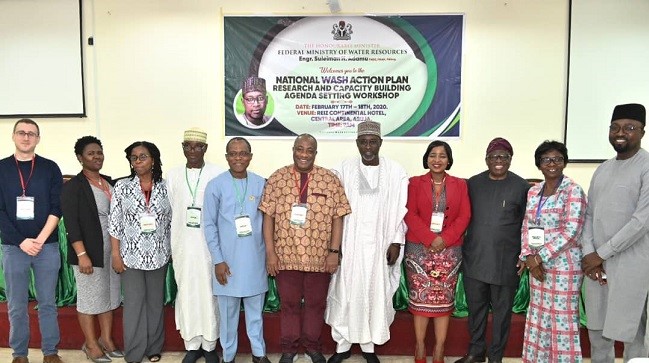The Federal Government of Nigeria has announced the establishment of a National Water, Sanitation and Hygiene Capacity Building and Research Programme to strengthen human capacity for sanitation delivery and drive the plan to eliminate open defecation by 2025 and provide universal access to water and sanitation by 2030.

The announcement came at a two-day workshop organised to clarify Nigeria’s overall needs in the areas of capacity building and research and set the agenda for a series of M.Sc. programmes set to run at select Nigerian universities and at the UNESCO IHE Delft Institute for Water Education in the Netherlands.
The move is part of a series of activities approved by government to achieve national targets on water, sanitation and hygiene outlined in the National WASH Action Plan to accelerate progress on ensuring water, sanitation and hygiene for all in Nigeria.
The capacity building and research programmes are part of the signing of a Memorandum of Understanding (MoU) between Nigeria and the UNESCO IHE Delft Institute for Water Education, a component of which is technical support to develop a corps of senior and middle level manpower that can address Nigeria’s sanitation crisis.
Under the proposed collaboration, selected Nigerian universities will join the Global Sanitation Graduate School, managed by IHE Delft with the support of the Bill & Melinda Gates Foundation. The programme will transfer the IHE, Delft run M.Sc. programme in Sanitation to the six capacity network centres of the Nigeria’s National Water Resources Institute (NWRI) in universities across the six geopolitical zones of the country. It will offer the Professional Graduate Diploma Programme in Sanitation through on-campus and online courses.
Limited knowledge, capacity and capability on wastewater and faecal sludge management and reuse remain a key bottleneck to sanitation attainment in the country. Improving the technical capacity of water agencies at the federal, state, and local government levels is a crucial objective of the National WASH Action Plan to revitalise the water, sanitation and hygiene sector.
The National Action Plan was launched alongside the declaration of a “State of Emergency” in Nigeria’s water and sanitation sector by President Muhammadu Buhari in November 2018, a move that is to date considered a demonstration of the highest political will by the Federal Government to address Nigeria’s water and sanitation crisis.
Under the series of professional programmes in Sanitation, the National Water Resources Institute (NWRI) will be strengthened to coordinate training programmes for urban areas, small towns, and rural water supply and sanitation practitioners.
Director, Water Supply & PPP, Federal Ministry of Water Resources, Benson Ajiegiri, said it is envisaged that components of the proposed research and capacity building programme will include specialisations for young school leavers seeking undergraduate education and career paths, senior and middle level manpower, artisans and technical field workers and continuous learning opportunities for all existing sector professionals.
Opening the workshop, Minster of Water Resources, Suleiman Adamu, said: “The Federal Government of Nigeria is resolved and committed to vigorously pursuing the Sustainable Development Goal (SDG) 6 and ensuring that we ‘leave no one behind’ in implementation of the National Action Plan. We are aware that time is of the essence to achieve this goal and as such, our actions need to be immediate and deliberate. Together, I believe we can create a synergy that will transform Nigeria’s water, sanitation and hygiene sector.”
Timeyin Uwejamomere, Consultant/National Coordinator of the National Action Plan, said: “Nigeria needs to build 9.4 million toilets to support the country’s ambition of ending open defecation by 2025 and achieving universal sanitation access by 2030. African Ministers’ Council on Water (AMCOW) Executive Secretary, Canisius Kanangire, believes the capacity to do this lies within the country.
“We need to be problem-solvers and build a critical mass of people who understand the issues and can help translate and apply learning to solve the water, sanitation and hygiene crisis.”
Speaking at the workshop, WaterAid Nigeria’s Country Director, Evelyn Mere, said: “Without adequate capacity and good quality research to continually generate learning and knowledge in the sector, the ambitious agenda of ending open defecation and realising sanitation access for all in Nigeria will remain unattainable.”
The workshop set out to evaluate the number, quality and depth of the human capacity that would be required to deliver a sustainable, universal WASH for Nigeria and outline a programme of work to meet the human resources gap in delivering a sustainable WASH in Nigeria.
It was attended by international and national leading academics and professionals in the water and sanitation sector, relevant federal government Ministries, Departments and Agencies, the National Universities Commission, the Nigerian Board of Technical Education, development partners, national and international non-governmental organisations.
Outcomes from the workshop include a National Sanitation and Hygiene Research and Capacity Building Plan and the Plan of Action for the adoption and implementation of the Global Sanitation Graduate School Programme in Nigeria.
